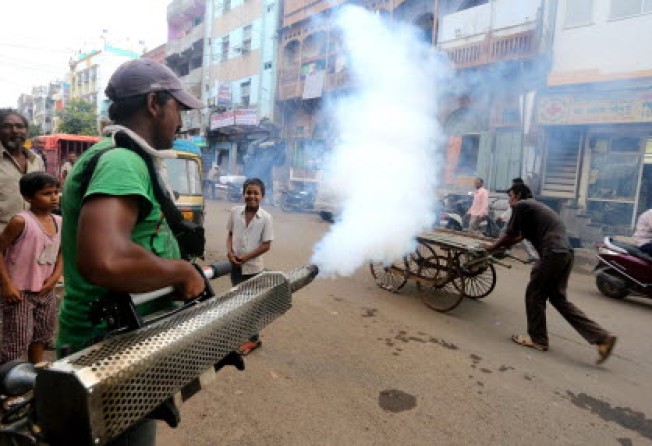Mosquito crackdown in Guangzhou as dengue fever cases surge
About 400 people were reported to have the mosquito-borne virus up to last week; killing insects and removing standing water are keys to prevention, officials say

Dengue fever is spreading in Guangzhou, as the number of cases has surged rapidly over the past month, local health authorities say.
The city’s Health Bureau says that since the first case was reported at the end of June, about 400 cases had been reported by Wednesday. No deaths from the disease have been reported so far.
The figures are up considerably from a little more than 100 cases in the city last year, and fewer than 20 in 2012, Guangzhou Daily reports. Nearly half of this year’s patients, 191 cases, were found in the historical Yuexiu district, 97 in Nansha district, 48 in Baiyun district, and 21 were identified as having been infected by the virus abroad.
The bureau said the area in Guangzhou where the cases have been pinpointed has widened from 33 streets at the beginning of this month to 52 last week.
“According to the situation of the past few years, the epidemic of this year has just commenced. The peak will come in the future,” Huang Fuchu, director of the Yuexiu district health bureau, was quoted by Yangcheng Evening News as saying. “Therefore, it might prove more difficult to control the disease than we imagined.”
The disease, carried by mosquitoes, is caused by the dengue virus. Symptoms include a skin rash similar to measles along with a headache and muscle and joint pains. A small percentage of patients could develop a life-threatening hemorragic fever or dengue shock syndrome, in which blood pressure drops dangerously low.
Guangzhou has mobilised 800 workers to spray mosquito repellent every Friday afternoon and distribute mosquito-eradication tablets to the public that need to be ignited every evening.
An unidentified official from Yuexiu’s Disease Control and Prevention Centre said the population density in Yuexiu is higher than other districts, and there are more old houses, thus accounting for the higher number of cases.
However, many residents are not convinced that disease prevention is important, he said.
Killing mosquitoes and not leaving water to stagnate are the two keys to combating the fever’s spread, the official said.
“At recent events to raise public awareness, we told people that many patients have to be hospitalised for treatment and have to pay thousands of yuan in medical bills,” he said.
“They wouldn’t be able to work for some time and would have to bear most of the cost themselves, instead of by the medical insurance scheme. So we want to remind people to remove puddles of water before they stagnate to protect themselves from dengue fever.”
The World Health Organisation estimates up to 50 million to 100 million people are infected with dengue fever each year. To this point, the disease has no vaccine.